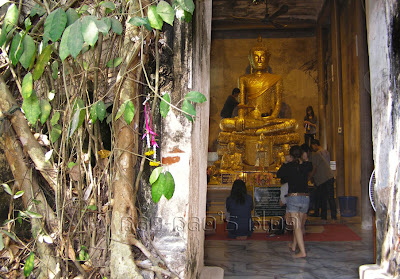 |
| Yes... there's a temple in there, behind the tree growth |
Some of you probably attempt to keep house plants living in your homes. If you do, you already know that what's called a "weeping fig" plant in some parts of the US (technically a ficus benjamina) tends to be difficult to keep content. Even after a decade together if I speak to mine crossly it drops a dozen leaves. Although I know full well they're two very different climates it's been a (minor) source of frustration for me in Thailand to see plants I struggle to grow back home being considered invasive pests, and this was one example.
Camp Bang Kung isn't the Thai army camp it was years back; it has a history that goes back to when it was much more of a going concern, in the days when King Rama II was born nearby. [The posts about Rama II Park are here and here].
 |
| A look through the front doorway |
Sitting to one side of the grounds is a small temple/ordination hall that over the years has become nearly completely engulfed by ficus trees, grown with great vigor to an impressive size. It's not unusual to see ficus trees near Buddhist temples, as it was beneath a ficus religiosa tree that the Buddha is believed to have found enlightenment, or Bhodi, but this small building has been so firmly embraced by it that the tree may actually be holding the structure up.
As is often the case at historical or religious sites you'll see school groups on weekdays, out on a field trip; something many reading this remember but an educational tool being lost here in the U.S. to budget cut-backs, litigation and other foolish decisions (in my opinion, anyway). The groups we saw were thoroughly enjoying their day, and it was nice to see. You can see some of them in the photo above that I'm including to show some perspective for the building itself, which wasn't all that large. The rear of the building is the only side not nearly covered by the tree.
The last photo today is my favorite, I think. It shows what I'm remembering as the rear portion of the East side. Through the doorway you can see the stairs going up behind the large Buddha statue that towers over visitors coming in through the front.
More on the interior and grounds tomorrow.



No comments:
Post a Comment